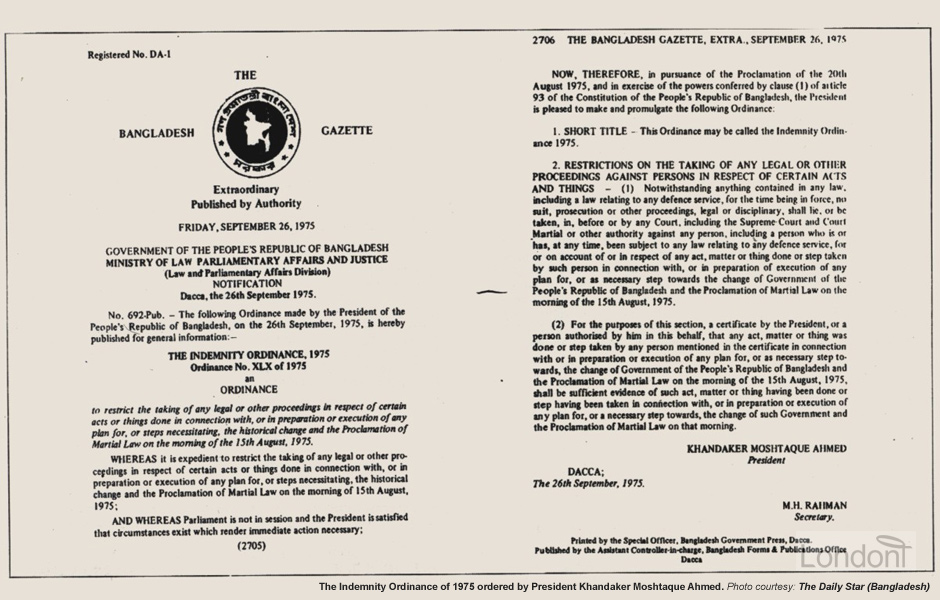
'Indemnity Act' protects killers
On 26 September 1975, six weeks (or 42 days) after Sheikh Mujib's killing, President Khandaker Moshtaque Ahmed passed an 'Indemnity Act' in the form of an Ordinance (i.e. rule of law which is passed by the Head of State) which granted immunity from prosecution to those involved in the 15 August killings. It was titled 'Indemnity Ordinance 1975', being Ordinance No. 50 of 1975. This meant that the conspirators could not be tried in court of law on the charge of assassination as the acts were deemed to have been a 'historical necessity'.
The Act was published in a Gazette Extraordinary - but without the usual publicity in the media. There was a good reason for the secrecy for surely there would have been a public outcry had its contents been known. The Act ultimately allowed the killers to leave the country without facing any trial for the murders.
The Ordinance was promulgated to restrict the taking of any legal or other proceedings in respect of certain acts or things in connection with, or in preparation or execution of any plan for, or steps necessitating, the historical change and the Proclamation of Martial Law on the morning of 15th August, 1975.
Hidden by the legal verbiage was total exculpation for the Majors, their men and all those involved with them not only in respect of the killings and the coup of 15 August 1975, but also in the planning and abetment of it. In effect it was a comprehensive pardon for the men who had slaughtered the Founding Father of the nation and 21 members of his family.
In the circumstances, no one expected Moshtaque to prosecute Mujib's killers. But to formally pardon them is an entirely different thing. I was told later that not even Farook and Rashid expected it or thought it necessary. But Moshtaque, ever the casuist, was playing it safe for his was more than a casual role in the grisly affair. I don't know whether he issued himself an 'indemnity certificate' like the others were promised. Certainly the terms of the Ordinance were broad enough even for this purpose.
Moshtaque: Farook and Rashid are "surya shontan"
Not content with just pardoning the killers, President Moshtaque promoted both Syed Farook Rahman and Abdur Rashid Khandaker from major to Lieutenant Colonel. Furthermore, he heaped extravagant praise on both men in a radio broadcast on 3 October 1975 by calling them "surya shontan" (the sons of the sun) of the armed forces.
The macabre took a new twist when Khandaker Moshtaque Ahmed came on air, to tell a disbelieving nation that those who had carried out the coup were children of the sun, 'surjoshontan' (referring to Bangabandhu).
Irony took a new meaning. Murderers were being honoured with the grandeur of the sun.
Syed Badrul Ahsan, Journalist
This had the most shattering effect on the morale and discipline in the armed forces. Clearly established for officers and men was the precedent that anything is permissible - mutiny, mayhem, murder - only don't get caught doing it. All this would foster widespread unrest and Bonapartism, attempted coups and counter-coups, and General Zia Rahman's assassination in Chittagong seven years later.
Sheikh Mujibur Rahman, by his free-wheeling ways, broke the sequence of crime and punishment in Bangladesh and for betraying the people brought down upon himself and the country a terrible legacy of blood. Khandaker Moshtaque, during the brief 83 days of his stewardship, formally cemented the break and multiplied the legacy many times over.
Fifth Amendment to Constitution of Bangladesh under Ziaur Rahman government
Later when General Ziaur Rahman became President (November 1976 - May 1981) his BNP government made changes to the Constitution of Bangladesh (the 'Fifth Amendment') which legalized all measures taken by the government between 15 August 1975 (the date of the killing of Sheikh Mujibur Rahman and his family members) and 9 April 1979 (the date martial law was lifted).
The measures were deemed to have been validly made, done or taken and shall not be called in question on or before any Court, or Tribunal on any ground whatsoever.
Constitution of the People’s republic of Bangladesh, Fourth Schedule, 3A
This Fifth Amendment meant the Indemnity Act became a part of the Constitution of Bangladesh and no action could be taken against the killers of Sheikh Mujibur Rahman and his family members.
As S. M. Limpet has emphasised, the way a nation is born conditions much of its later political development. Bangladesh was born through a bloody revolution which spawned ideas that disrupted the pre-revolution consensus among the Bangladesh leaders about the adoption of parliamentary government.
Talukder Maniruzzaman, analyst
Detainment of Sheikh Mujib loyalists including char netas
During his brief spell in power President Moshtaque took steps to remove all possible rivals in the political field. He reckoned the main threat, apart from the unstable army, came from his old party, the Awami League. Its leaders could become a rallying point for the opposition. So as soon as he was satisfied that the country had accepted Mujib's killing. Moshtaque quickly rounded up the four men who had been most prominent in the Mujibnagar government in Kolkata - Tajuddin Ahmad, Syed Nazrul Islam, Mansoor Ali and A.H.M. Qamruzzaman.
